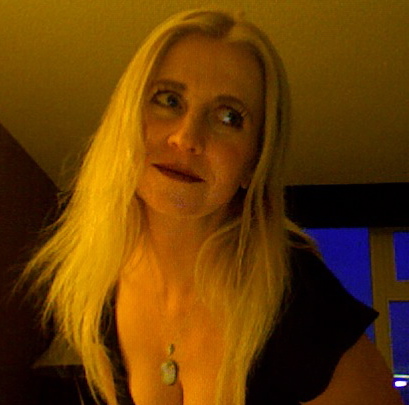A Rose Garden
Chapter 4
June
“What time is supper?” Flora asked. At first glance, Flora looked concerningly sweaty and flushed, but as she walked into the kitchen, Elsa realized that her face was purposely painted pink with a glossy facial mask.
“Oscar’s making the pizza dough, right after he finishes playing badminton with Wyatt—what happened to the tomato? Did someone eat the tomato? I had it right here, ripening, specifically for tonight’s pizza.” Elsa said.
“Wyatt put it on his nachos. Call Dad. Maybe he can pick one up on his way home.”
Hugo’s phone went directly to voice mail. “He’s not answering. I have all that fresh basil to use…I wanted to make a margarita pizza.”
“I’d go down the mountain but the mask,” Flora said, pointing to her face. “Wyatt, you can go to the grocery store—right?” Flora shouted from the open kitchen window.
“Ah…I guess,” Wyatt said, and then smacked a birdie over the net.
Elsa wandered out the balcony to glance at the newly planted rose bush. It already had eight tiny buds forming. Leroy growled. “Inside!” Elsa instructed, and then dragged Leroy by the collar through the balcony door into the living room. “Don’t let Leroy out,” Elsa said to Oscar, as he placed a freshly kneaded mound of dough into a greased aluminum bowl. “There’s a deer in our yard, she looks thin—I don’t want him to frighten her.”
Elsa watched the deer from the balcony. It could easily be the same doe that chased her through the forest earlier that spring. Though the fawn would be old enough to be grazing alongside its mom, and there was no fawn. It was a hard life for a fawn on the mountain. The forest was home to a healthy number of coyotes and frequented by too many off-leash dogs, and then there was the road traffic. Elsa was silent as the deer nibbled its way through the yard, systematically eating the tips off of the petunias, and the cosmos in the ceramic pots—flowers Flora had planted and considered her own—and then the lilac branches. Elsa flinched as the deer took interest in the grapevine that crawled along the fence. She let the deer follow the vine, tasting the future grapes, watching, as the doe edged closer and closer towards the rose garden. Elsa slid open the patio door. “Quick, Oscar! Bring me two metal pot lids from the pots and pans cupboard. There’s no way I’m letting her near my rose!”
The deer stood at the edge of the bricks. She glanced up at Elsa, who stood poised on the balcony, pot lids dangling like cymbals in an orchestra, waiting to be played. “Shu!” Elsa shouted. The deer shook her head—as though irritated by Elsa’s command—and then lifted her front leg over the brick wall, gently placed a hoof in the garden, and swung her head towards the rose bush. Elsa clapped the lids together, a crowning moment in the morning’s drama. The deer’s head shot up and she jumped backward, out of the garden, and then froze. She glared at Elsa, with more of a baffled expression than fear. Elsa clapped the lids together again. Leroy poked his nose through the slightly open patio door and barked sharply. The deer took long, elegant strides towards the fence and jumped into the neighbour’s yard. “I let her eat everything but the roses,” Elsa said to Oscar.
A familiar tune—musical bells chiming in an annoying way, that infringed on the natural mountain sounds, and yet, was also comforting—an unexpected reminder of a lost, more hopeful world. “The ice cream truck!” Oscar shouted, with the same excitement he’d had as a toddler, when he first discovered the rewards that came with the sound of an ice cream truck, circling the suburban neighbourhood.
Flora ran onto the deck. “Is that the ice cream truck?” she asked guardedly, as though afraid it might not be real. Their youthful earnestness was rare, unwitnessed since the quarantine, and it was immediately contagious. Elsa laughed. It was tradition, she’d always allowed Flora and Oscar one trip to the ice cream truck a year. Though, it had been years since the truck had ventured up the mountain, as high gas prices hadn’t made it worth the trip.
Hugo and Wyatt arrived home in tandem. Wyatt, paused, waiting for the ice cream truck to move from in front of the driveway. A masked-woman, with a sterile-gloved hand, gave Oscar a paper-wrapped ice cream cone. Flora, lingered beside Oscar—her face still frighteningly pink—unwrapping her iced treat. Hugo idled on the hill, behind the SUV, awaiting his turn to pull into the driveway. Elsa pictured a look of intense impatience on his face, but couldn’t see him for the large maple that blocked her view of the street.
Wyatt unpacked the groceries onto the designated counter space, between the two strips of duck-tape. He smiled as he placed each item on the counter, an expression that oozed pride and satisfaction. The tomato wasn’t organic. Nothing Wyatt bought was organic. The family was trained to shop exclusively organic, to avoid glyphosate contamination. It had become almost instinctive. Elsa had completely forgotten to mention it to Wyatt. She’d have Flora subtly mention the organic angle to Wyatt at another time. There was no point in squashing his efforts to help contribute to the family. “Thank you for picking up the groceries, Wyatt—were people social distancing?”
“I guess, there was like no one in there,” he said.
“That’s good—don’t forget to sanitize your hands,” Elsa said. She filled a bowl with hot water, poured in a little bleach, put on rubber gloves, and then gently wiped down the groceries. She spared the tomatoes and bananas from the bleach-brew; instead, she rinsed them in the sink.
“Did you get my chips?” Flora asked. The violent pink hue was gone and her face was freshly-scrubbed. Wyatt held up a bag of freshly bleached kettle chips. “Those aren’t organic!”
“It’s okay, Flora—Oscar, call dad—tell him to wash his hands, it’s time to make the pizzas,” Elsa said, as she disinfected the countertop between the duct tape.
Elsa couldn’t breathe. It was as though her body forgot how to inhale. She willed herself to inhale and then sat upright in bed, gasping for air. The room was dark and smelled of campfire. Elsa crept out of bed and closed the window.
Hugo was gone when she awoke at six—his daily ten kilometer run along the lake. The air in the room was stale. Elsa pulled on a robe—it felt like an unnecessary fabric burden—something she never wore except when Wyatt slept over. She pushed open the sliding door and stepped into a thick grey haze. The smoke was too impenetrable to see the rose garden below. She pulled the balcony door closed behind her. She tapped softly on Flora’s door, and immediately entered, knowing they’d still be sleeping. She leaned over Flora and Wyatt’s bodies and slid Flora’s bedroom window shut. She crept into Oscar’s darkroom, relieved to find his bedroom smelling familiar—a combination of rotting-snacks and dirty clothes—and his window closed. She turned on the air conditioner for the first time that year. She’d had the presence of mind to purchase the highest quality furnace filters. They used the central air more often as an air-filter than an air-cooler. In the fifteen years that they’d lived on the mountain, the summers had grown continually drier; they reluctantly accepted that smoke from a massive firestorm—burning somewhere on the continent—would ruin a significant portion of the summer.
Elsa tip-toed down the stairs and out the front door, tucking her nose under the neck of her undershirt as an impromptu smoke filter. She couldn’t find the rose garden through the opaque air until she reached the bricks. Delicate hoof prints encircled the Abraham Darby. The top of each of its branches was bitten off—all of the buds decapitated, except one.
Hugo walked into the kitchen, smelling of campfire and sweat. “Morning,” he said as he strode past, hoping to get into the shower before being asked to start any morning chores.
Elsa sat on a stool at the kitchen island, her robe hung open to reveal the boxers and undershirt that she’d slept in. “She came back.”
“What?”
“That deer from yesterday—the one I scared out of the garden by banging pot lids—the little bitch came back in the night and finished off my roses.”
“Oh—that’s not good.”
“No it’s not. I was so generous, I let her eat almost everything!” Hugo’s face was excessively pink, as though he’d put on one of Flora’s facial masks. “Why did you go running? You know running in smoke is extremely hard on the heart and lungs.”
“I was fine.”
“Only an idiot would hurt their body like that.”
“Thanks,” Hugo said.
“You’re not welcome. Seriously, you have to set an example for the children. You can’t go out running in this fucking smoke.”
“What am I supposed to do? I can’t run on a treadmill—the gyms are closed because of COVID. I can’t sit around and do nothing.” Elsa was silent. She had no idea how she was going to survive the smoke either. Outside was all they had—COVID had robbed them of any and all safe indoor spaces except the house. “It will blow through soon. There are no local fires,” Hugo added.
Elsa scanned the internet news. Hugo was right, the smoke had blown in—California and Oregon were on fire.
The smoke didn’t blow through. It hung on, like a blanket of doom. There was no mountain, there was no lake, there was only an ocean of grey, beaches of ash. It didn’t matter if Elsa left the blinds open at night, even the street light was dulled by the smoke.
Elsa drove with Hugo to the university and ran up and down the cement staircase in the building of Hugo’s office until her lungs burned and she tasted blood. The smoke ignited her exercise-induced asthma. It had been dormant for so long—probably since the last fire season—that she’d forgotten to bring her inhaler.
The country was beginning to re-open. The toy store offered Wyatt two days a week with the intent to ease into full-time, as long as COVID numbers didn’t skyrocket and shut the country down again. Flora’s job at the University, as coordinator of the hands-on summer Engineering camp for kids, was canceled. It was a blow for Flora. She was counting on the income to supplement her next year at university. Though Flora’s financial woes were secondary, it was the toy store that posed the greatest immediate threat to the family.
Elsa knocked on Flora’s door. Wyatt and Flora were on her bed, watching a video on a laptop together. “I need to talk to you two.” She sat on Flora’s wicker vanity stool. “When and if Wyatt returns to work at the mall, we have to be prepared. We can’t take the risk of Wyatt bringing home the virus to Dad. You both might want to consider moving into Wyatt’s house until COVID blows through.” Wyatt laughed, as though it was some preposterous joke. Flora was silent. “You’ll have to decide soon,” Elsa said and left the room.
🌹
Hugo carried his spaghetti supper down the hall towards the master bedroom. “Don’t eat garlic toast in the bed,” Elsa said from her seat at the dining room table. Hugo glanced her way but said nothing. He had a wide-eyed, eager, yet distracted, expression on his face. “If I find crumbs in the sheets tonight, I’ll know it was you!” The bedroom door closed. Elsa rolled her eyes—no doubt he was rushing to bed to watch some asinine comedy on his laptop. Elsa stirred the spaghetti around her fork. She’d added too much meat at Hugo’s suggestion. She put down the fork and then ripped apart a slice of garlic toast and tossed half of it to Leroy. Flora rushed into the kitchen and grabbed the car keys from the window sill. “Where are you going?”
“I’m getting a treat,” Flora said, avoiding eye contact with Elsa. She trotted down the stairs in a nervous rush, as though she was late for a job interview.
“You never even tried supper!” Elsa shouted.
The garage door banged shut. Elsa pushed her chair from the table and wandered down the hall and into Flora’s bedroom. The room was tidy and serene. The early evening sun had turned the walls a warm apricot hue. Leroy sorted through Flora’s wastebasket. “Drop it!” Elsa said as she pried a French fry container from Leroy’s mouth. The basket was overflowing with various fast food bags. Elsa had not yet broached the matter with Flora. Flora had a history of not eating when under stress—junk food was better than no food. Though, Elsa could not watch idly as her daughter poisoned herself. She would try to subtly reinforce the “organic treats only” rule.
Elsa knocked on Oscar’s door and when he did not reply, she opened it. He sat on his unmade bed, reading. Garlic toast crusts were piled on a dinner plate beside him. He glanced up at Elsa and then returned his gaze to the book. “I feel bad, that the only fun I have isn’t real,” he said.
Elsa took a slow breath in and exhaled silently. “What do you mean?”
Tears formed in Oscar’s eyes. “All I think about now is wishing I could go to Hogwarts and live the adventures they have…instead of living real adventures.”
Elsa glanced out his bedroom window, into the backyard. Three badminton rackets lay in the grass—untouched since Wyatt left. “The smoke level is only moderate this evening. Why don’t you call your friends and see if they want to meet you at the beach tonight—you could take the volleyball.”
“No thanks.”
“Why not?”
“No one’s social distancing—I don’t want to catch COVID.”
Elsa stretched out on the sofa in the dark family room, holding a glass of organic wine. She had just finished two consecutive episodes of the Scottish detective drama. It was past eleven. She wouldn’t be able to get up early. Though, Leroy would be the only one who would notice if she slept in. Hugo left for the university before eight, and lately, Flora and Oscar slept until nearly noon. She took a sip of wine, spilling a little on her chest, as the third episode began.






Leave a Reply